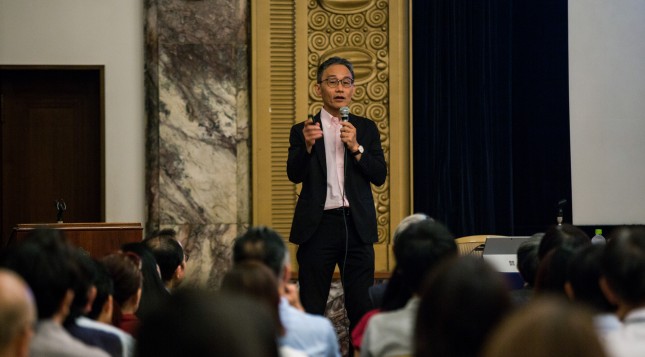Transforming Marunouchi into a “city where engineers want to work”: Active start-up personnel discuss the secret of hiring engineers and Mitsubishi Estate’s new initiative with div
“Recruitment of engineers” is currently one of the most important issues faced by many companies, not just tech start-ups. No matter how good an idea is, it is just a pie in the sky without an engineer to execute it. It is no exaggeration to say that the success or failure in hiring engineers determines the success of a business.
However, the number of web engineers is still not adequate, and many start-ups are struggling to hire engineers. This time, we interviewed Takafumi Masui of Holmes, Makoto Naito of div Co., Ltd., and Yusuke Iwamoto of Mitsubishi Estate about what a start-up needs to do to succeed in hiring engineers.
Masui, an excellent human resource, joined Holmes when there were about 10 employees and has helped the organization grow to about 50 employees. What does Masui, who has diverse experience with large companies, mega ventures, and start-ups, consider important for hiring engineers?
In addition, div, which operates the programming school “Tech Camp,” will start a new initiative with Mitsubishi Estate to support the recruitment of engineers in Marunouchi. This project seeks to match Tech Camp graduates with Marunouchi start-ups for internships. How will this change the recruitment of start-up engineers? We present a discussion with three of them.
INDEX
・Number of employees has increased from “10 people to 50 people”: The secret to creating an organization for the development of engineers and growth of services
・“Internship System” to promote vision match
・Transform Marunouchi into a “city where engineers want to work”
・Key points

Takafumi Masui
Holmes Co., Ltd. Talent Acquisition Manager
After promoting systems planning and operations and group-sharing services at the NTT DATA Human Resources Department, he went on to work as an HR business partner in the MR personnel department of a foreign pharmaceutical company. He promoted new businesses and business restructuring at Gree Co., Ltd. as a human resources manager of a game management subsidiary and a human resources manager of an advertising media business subsidiary. He joined Holmes as the talent acquisition manager in February 2019.

Makoto Naito
Director of div Co., Ltd.
Joined Phenix Co., Ltd. in 2000 and was engaged in sales management in Japan and Asia
He joined div Co., Ltd. in April 2017. After working as the TECH CAMP business manager, he became an executive officer of the Company in January 2018. He supervises sales, classroom management, career support, customer support, and base development. He was appointed as director of div in June 2020.

Yusuke Iwamoto
Mitsubishi Estate Co., Ltd. xTECH Administration Department
He joined Mitsubishi Estate Co., Ltd. in 2002. He was involved in property management work for complex buildings and start-up work for new buildings. After that, he worked in the public relations department, following which he became responsible for product planning and tenant leasing for the innovation base “Shin Tokyo 4TH” in the building sales department. Currently, he is in the xTECH Administration Department and in charge of attracting domestic and overseas growth companies.
Number of employees has increased from “10 people to 50 people”: The secret to creating an organization for the development of engineers and growth of services
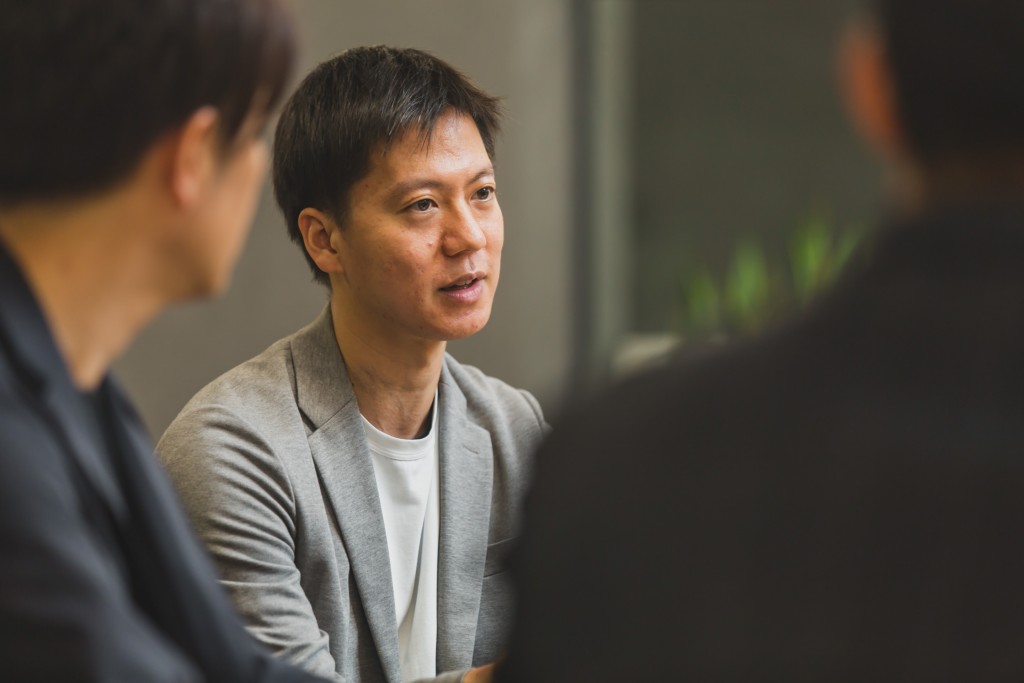
First, we would like to ask Masui from “Holmes,” a start-up that develops contract management systems, about the secret to hiring engineers. How has Masui, who has worked hard in human resources at NTT DATA and GREE, made use of his experience so far?
Masui: NTT DATA is an SI developer of heavy infrastructure systems such as finance, and GREE is in the entertainment sector, but in front-end development. So, the thought process of job seekers in those companies is completely different from that of job seekers in the current company. Even if we hire the same engineer, we cannot use their experience as it is. It has been difficult to convey to web engineers the fun in developing a new service in the form of a contract management system and the possibilities for the future.
To put it bluntly, I think that the experience of the NTT DATA era is being utilized to make people feel the social significance. NTT DATA engineers took pride in “creating government offices and financial infrastructure that support the country” and “providing systems to emerging countries to use Japanese technology to develop the world.” Similarly, the “Homes Cloud” developed by Holmes has social significance in that it is an “innovative service that optimizes contracts,” and “contract lifecycle management is a service that fundamentally supports business operations.”
Masui, who has been hiring, gives importance to how much a candidate empathizes with the company’s aspirations and vision. However, it seems that engineers are struggling to talk about their vision when compared to human resources in sales and business development.
Masui: I have worked in the IT industry for a long time, but I have no experience with SE. The so-called Bizdev human resources seemed clearly excited about the innovative vision, but engineers tended to be unresponsive and felt uncomfortable. At that time, I was able to hire an excellent VP of Engineering, and the hiring of engineers accelerated at once. The CTO and VPoE bring out the technical appeal, and I, as the hiring manager, convey the company’s vision and appeal, “Why don’t we achieve this vision together and create a new society?” As we have decided to create a small team of elite people who empathize with our vision, we will do our utmost to convey our values using Wantedly, owned media, and videos, among others.
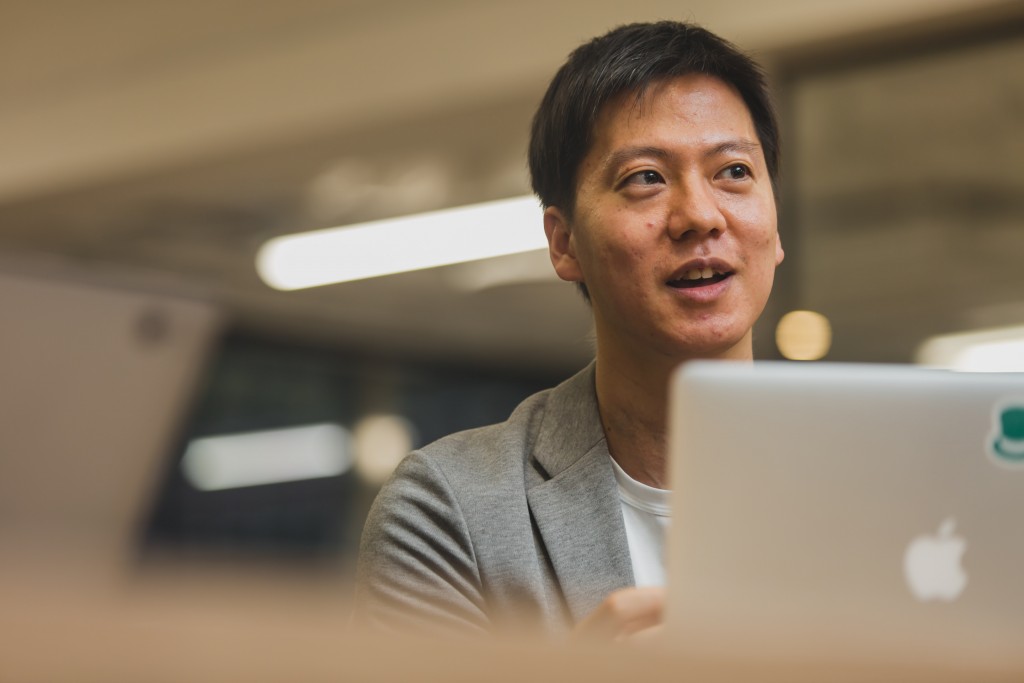
The positive thing about Holmes is that they are hiring engineers, who, of course, are not quitting. Only one engineer has reportedly retired since Masui took charge of recruitment activities. What are the secret measures being taken?
Masui: I think the biggest factor is that the CTO, VPoE, and Scrum Master take the lead in creating an environment that allows the development team to concentrate on their work while ensuring psychological safety. Engineering is basically a profession wherein many people have a strong desire to learn. Therefore, even if the entry is based on empathy with the company’s values, the environment must allow an engineer to improve his or her skills and ensure a long-term career. We set goals semi-annually and select modern development environments such as architecture and frameworks. In an era when the need for remote work and DX in companies is growing due to the spread of the COVID-19 infection, how should cutting-edge technologies such as Smart Contract, AI, and blockchain be put into practical use even in the area of contracts? This is an important issue to be considered. From a medium- to long-term perspective, I think we have a challenging environment for engineers.
However, I think it is important to be divisible while creating an environment that satisfies engineers. It has only been two years since I joined. Some people may quit. In fact, some engineers have begun to feel cramped, as there are opinions such as “the atmosphere is not what it was previously” and “the organization has become a hierarchical organization and a distance has been created with the founder.”
As an organization grows, the system and atmosphere will change, and there is no choice but for human resources to change as the requirements of an organization with 10 employees and one with 50 employees will be different. From my experience as a HR professional, I think it is impossible to create an organization where everyone can be satisfied. What is important is to create an organization that can provide ease of work and motivation for “employees who work sincerely and honestly toward the realization of their vision and mission.”
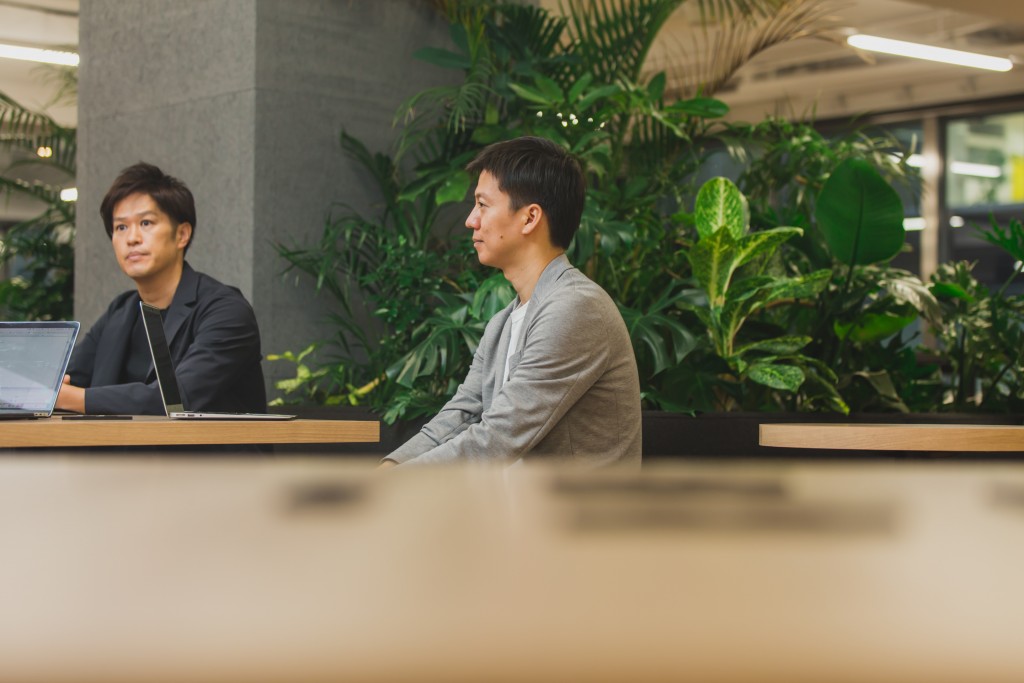
Masui seems to accept the fact that human resources get replaced as an organization grows. However, he also talks about the importance of having “human resources who work long term.”
Masui: People who are looking for something worthwhile in terms of job description or company conditions will quit if they change. However, those who empathize with the company’s vision can work without being disturbed even if the company’s situation changes. Therefore, in order to have them work for a long time, it is important to determine whether they really empathize with the vision.
In particular, start-up services become more complex as they grow. It is important to hire skilled engineers as the service grows, but it is also important to have the talent you have known since the early days. In order to develop services over the long term, we must create an environment where employees can work long term and engineers can grow.
“Internship System” to promote vision match

「Holmes has been hiring successfully with an emphasis on “empathy for the vision,” but it is not as easy as it sounds. The importance of “vision match” has long been talked about, but it is true that only a limited number of companies have succeeded. Naito of div talks about the background.
Naito: For several years, it has been said that vision matching is important, and start-ups are increasingly adopting referrals. As the resources being considered are referrals from an acquaintance, I can understand their background and hire with confidence. However, regardless of the introduction received from an acquaintance, there is a limit to understanding the person in a short time such as during a casual interview.
It is similar to recruitment. No matter how much you explain about the company and listen to job seekers, you may not know until you hire them. It is especially hard to judge the personality of engineers just by interviewing.
This is true for both job seekers and hiring companies.
I felt that there should be an opportunity to know more about the company atmosphere. So I devised a project in Marunouchi whereby Mitsubishi Estate hires tech camp graduates to intern at the company. If you actually work as an intern, you can gain a deeper understanding of the company’s vision and atmosphere.
The idea for the engineer internship project is said to have come from Mitsubishi Estate. What was the objective?
Iwamoto: Originally, the story started with what kind of city the Yurakucho area would be like in the future. The Marunouchi and Otemachi areas have been redeveloped and have established their identity as cities that are home to B2B startups and major companies including FinTech companies. I wanted to make it a city where people shine. To promote open innovation, we planned the “Shin Tokyo 4TH” (Shin-Tokyo Building 4th floor renewal) initiative that Tech Camp launched from the perspective of “creating an environment where engineers want to work.”
Having said that, engineers are not familiar with Marunouchi because it has a well-established image of being a “city of major companies,” and they do not envision working in Marunouchi. In such a situation, we continued to stick with the philosophy “Let’s train engineers from Marunouchi and match them with companies in Marunouchi.” Engineers who grew up in this city would surely like this city, and I thought that if the engineers were able to establish themselves, Marunouchi would become a “city where new services are generated.”
Up until now, start-ups have flocked to Shibuya, Roppongi, and recently Gotanda, but I would like to add Marunouchi to that list.
Naito: It is true that tech camp graduates have produced companies mainly in Shibuya and Roppongi in Tokyo. However, there are many engineers who want to work in Marunouchi where there have been fewer opportunities so far. About 50 engineers are generated every month at the Marunouchi school alone. So, I would like to create opportunities for them to meet with companies in Marunouchi.
Many companies have already agreed with the engineer internship project, and even companies with about 10 employees want to accept internships. As employers, they seem to be expecting to close the hiring gap by identifying engineers during the period of internship.
Transform Marunouchi into a “city where engineers want to work”

Tech camps now have schools all over the country, but Naito says that many students who attend schools in Marunouchi are studying while working at a company, and many are actively studying while devising time.
Naito: Many of the students who go to schools in Marunouchi are actually studying while working at a company, and they are very much interested in learning. They have an attitude of self-learning, so they do not need any support. I think that there are many people who can start working immediately by combining their skills with their previous job experiences.
Just because someone is a graduate from a tech camp does not necessarily mean that they are an engineer. However, if they apply coding knowledge to sales and direction, the possibilities are endless. Many people want to work as an engineer after graduation, but there are also many people who want to “create services” and “solve social issues” in the future.
Iwamoto: If someone like Naito grows up in this city using the incubation facilities of Mitsubishi Estate, I think a good ecosystem can be created.
Masui: I think the ecosystem of graduating from tech camp, honing skills at a company in Marunouchi, starting a business in Marunouchi, and investing in that company through a major company in Marunouchi is very idealistic. I hope Holmes can play a part in that evolution.
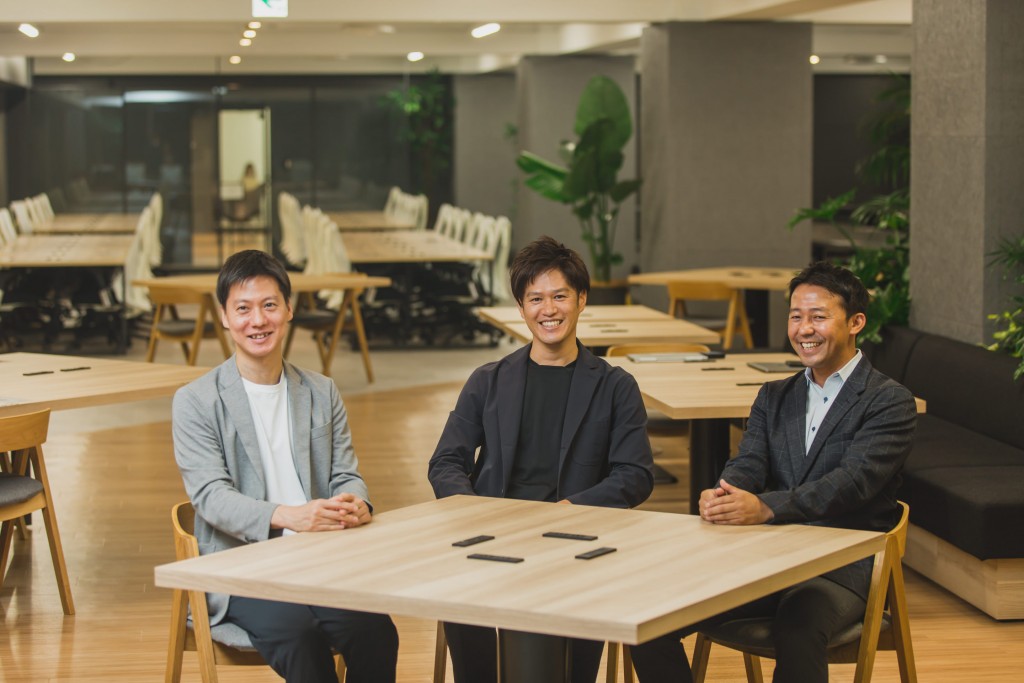
Both companies will start full-scale internships from now on. What are your prospects?
Naito: Specifically, I would like to produce 10,000 engineers each year by 2022. The number of engineers is not sufficient for the number of start-ups coming up right now. I would like to standardize the internship system and increase the number of engineers working at start-ups.
Eventually, I hope that the number of tech camp graduates will increase in Marunouchi, and that referrals will be provided by the graduates. Having engineers will foster a “culture where new things are generated.” I hope Marunouchi will transform into a “city where new things are born.”
Iwamoto: We need to have companies and people who can play a leading role in the next era in expanding the diversity of this city. So, I would like to increase the number of start-ups and engineers who want to work in Marunouchi. I hope that the number of companies that are born and developed in this city and the number of engineers traversing the local companies will increase.
I would like Marunouchi to attract worldwide attention as a city where new services are born, where business is most active in Japan, and where engineers play an active role.
Key poits
・At Holmes, we tell web engineers that “it is an innovative service” that “fundamentally supports business operations” so that they can feel the social significance.
・Engineers are less responsive in terms of talking about innovative visions. So, CTOs and VPoEs showcase their technical appeal, and hiring managers convey the company’s vision.
・The reason for the low turnover among engineers is that the company has created an environment that allows them to concentrate on their work while ensuring the psychological safety of the development team.
・Division is also important because it is not possible to create an organization that satisfies everyone.
・People who empathize with the company’s vision can work without being disturbed even if the company’s situation changes.
・As there is a limit to understanding a candidate in a short time such as during casual interviews, an engineer internship project was drafted to create an opportunity to know the company atmosphere.
・If engineers become established, Marunouchi will become a “city where new services are generated.”




 Inspired.Lab
Inspired.Lab 




